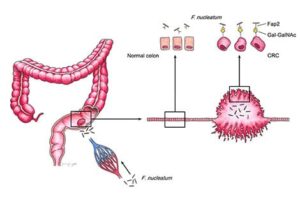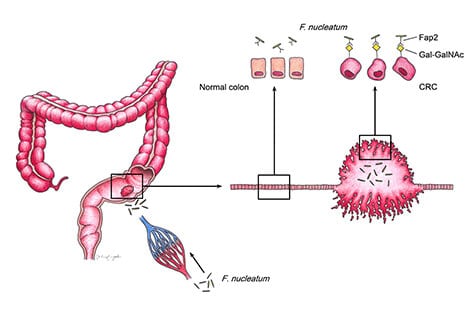Some bacteria, called fusobacteria, commonly found in the mouth, use a sugar-binding protein to stick to developing colorectal polyps and cancers, according to a new study by researchers from Harvard T.H. Chan School of Public Health and Hebrew University-Hadassah School of Dental Medicine. While certain fusobacteria have previously been shown to worsen colorectal cancer in animals by the Garrett Lab at Harvard Chan School, this study is the first to demonstrate how they may get to and stick to developing tumors.
Understanding this mechanism is an important step toward fighting colorectal cancer, said co-senior study author Wendy Garrett, Melvin J. and Geraldine L. Glimcher Associate Professor of Immunology and Infectious Diseases at Harvard Chan School. It might inform ways of blocking fusobacteria from homing in on colorectal tumors, she said. “Alternatively, and perhaps more importantly, our findings suggest that drugs targeting the same or similar mechanisms of bacterial sugar-binding proteins could potentially prevent these bacteria from exacerbating colorectal cancer.”
The study was published online August 10, 2016 in Cell Host & Microbe.
Colorectal cancer is the third leading cause of cancer-related deaths in the United States, and microbes have emerged as key factors that influence the development and progression of the disease.
Garrett and co-senior study author Gilad Bachrach of Hebrew University used human samples and mouse models to confirm their new findings on fusobacteria. Other Harvard Chan authors include Nora Ou and Caitlin Brennan.

This work was supported by the Israel Cancer Research Fund Project, the Israel Science Foundation, the National Institutes of Health (National Cancer Institute), and a Hoffman-LaRoche research grant. Garrett is a SAB member of Evelo Therapeutics and Synlogic and has consulted for Janssen Pharmaceuticals.
“Fap2 Mediates Fusobacterium nucleatum Colorectal Adenocarcinoma Enrichment by Binding to Tumor-Expressed Gal-GalNAc,” Jawad Abed, Johanna E.M. Emgård, Gideon Zamir, Mouhammad Faroja, Gideon Almogy, Amalie Grenov, Asaf Sol, Ronit Naor, Eli Pikarsky, Karine A. Atlan, Anna Mellul, Stella Chaushu, Abigail L. Manson, Ashlee M. Earl, Nora Ou, Caitlin A. Brennan, Wendy S. Garrett, and Gilad Bachrach, Cell Host & Microbe, online August 10, 2016, doi: 10.1016/j.chom.2016.07.006
If our reporting has informed or inspired you, please consider making a donation. Every contribution, no matter the size, empowers us to continue delivering accurate, engaging, and trustworthy science and medical news. Independent journalism requires time, effort, and resources—your support ensures we can keep uncovering the stories that matter most to you.
Join us in making knowledge accessible and impactful. Thank you for standing with us!

